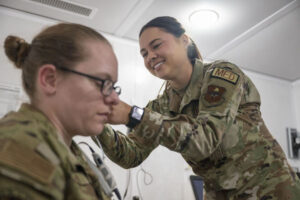
Story by Tech. Sgt. Tory Patterson
59th Medical Wing
For U.S. Air Force Captains Emily Lee and Jacqueline Anderson, life experiences highlighting the significance of being able to hear – one of the five senses many people may take for granted – led them to their current roles as Audiologists at Wilford Hall Ambulatory Surgical Center.
While perhaps difficult to imagine for someone with a Doctoral degree in Audiology, Anderson recalls having difficulty as a child in school due to hearing loss.
“As a twin and micropreemie being born 15 weeks early, I only had hearing develop in my left ear,” she explained. “My parents didn’t know that I had hearing loss until I was maybe 3-years old and it never got treated.”
Without treatment, Anderson said she struggled to hold conversations in the school cafeteria or pay attention in noisy classrooms.
“It led to a lot of social isolation,” she said.
Anderson remembered the day she was fitted with her first set of hearing aids.
“It wasn’t until I was 22 years old and I cried like a baby,” she said. “I was so thankful to the Audiologist who helped me; it reminds me of how this is a life-changing job.”
Similarly, Lee’s life was changed by witnessing the effects of hearing loss on a loved one.
“My grandma was a big part of helping raise my sister and me and she was very bubbly by nature – lively and talkative,” she said. “As her hearing loss progressed, I saw her livelihood dim down over the years.”
Lee recounted how her grandmother stopped parts of her normal routine, like eating in her assisted-living facility’s dining hall.
“That decline is something we learn about in class, but seeing it happen to somebody I love made me passionate about giving access to people who feel that their world is being cut or blocked out because of hearing loss,” said Lee.
Today, Lee and Anderson are medical professionals dedicated to evaluating, diagnosing, treating, and managing a wide-range of hearing loss and balance disorders in military patients. Both Audiologists completed residencies at Veterans Affairs (VA) Medical Centers and have seen the potential impacts of military service on hearing.
“Every single person that came through the door would say things like ‘I worked around artillery, explosions, firearms, I was on a ship next to machinery, or on the flightline,” said Lee. “Patients would say they were constantly around loud sounds not knowing what their lives would look like at 60, 70, and 80 years old when they just want to hear their grandchildren or the crunch of leaves on the ground.”
Better Hearing and Speech Month
For May’s “Better Hearing and Speech Month,” Lee and Anderson urge current service members to protect their gift of hearing.
“Hearing and health comes down to ensuring that you are being cognizant of the noise levels around you and using preventative measures like hearing protection appropriately,” said Lee. “Research and find out what hearing protection best works for you and use it every time you’re around noise.”
Wilford Hall’s Audiology Clinic offers a multitude of services – anything from evaluations and testing to managing hearing loss with amplification or implants.
The clinic also offers Progressive Tinnitus Management classes.
“It’s a research-based program coming out of the VA – they are true leaders in our field of Tinnitus management,” said Lee. “Unfortunately there’s no cure of Tinnitus at this time, but there’s research showing that people who take these classes and implement the strategies provided can experience improvement”
Active-duty service members do not need a referral to register for the Progressive Tinnitus Management class and can contact Wilford Hall Audiology to sign-up for the two-hour session, which is offered in-person or virtually.
“Getting a baseline hearing test is never a bad idea,” said Anderson. “If you’re having difficulties, there’s likely something we can do to improve your quality of life.”
And as someone who experienced hearing loss as a child, Anderson reminds parents that it’s important to keep their children’s audiology appointments.
“For our littles who have a lot of medical conditions and appointments, I know that sometimes hearing can go to the bottom of that list when other life-threatening things are going on,” said Anderson. “But please don’t let hearing fall off – it’s important to come back and monitor.”
Emergency Care
Lee and Anderson also explained that patients are frequently unsure of what constitutes an emergency of the ear.
“If you were to wake up and not hear anything out of one ear or the other or both, that is a medical emergency,” said Anderson. “I always recommend patients go to an Emergency Room or Urgent Care in that case. If you were to wait 2-3 weeks for an appointment, the damage may be irreversible by that time.”
Another ear emergency to look out for is any type of ear drainage.
“If you notice any blood, infected pus, or white drainage coming out of the ear canal, definitely seek emergency care,” said Anderson.
To avoid emergencies, she reminds patients not to insert anything, including cotton swabs, into the ear canal.
“The ear is so complex and it’s so sensitive – it functions so beautifully,” remarked Lee. “It’s a way we connect with the world.”